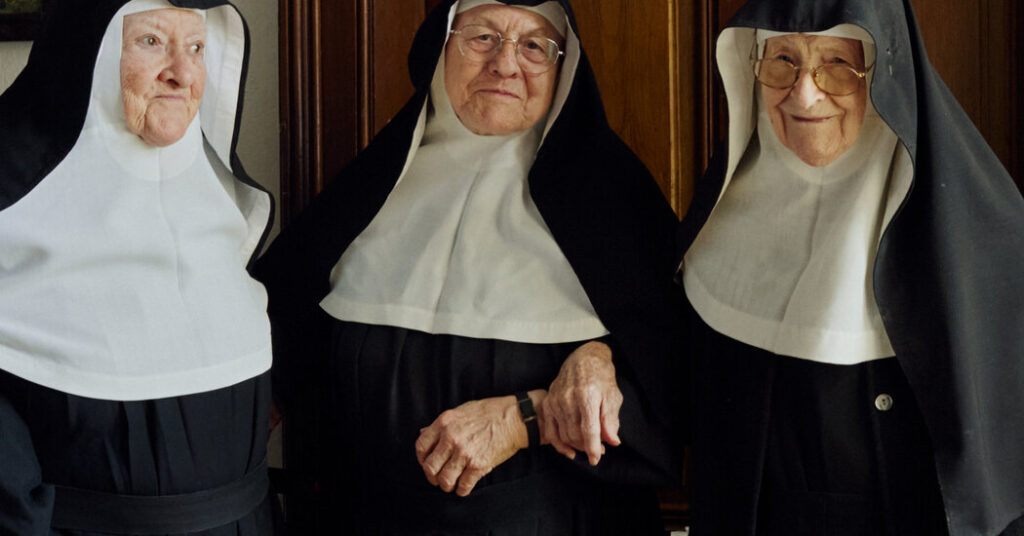When three octogenarian nuns escaped their senior center in September, their unlikely quest for freedom set off a bitter standoff with the abbot who leads their Roman Catholic order.
The three rebel nuns forced their way back into the Austrian abbey where they had lived for decades, before the senior center. That put them at odds with the abbot, who had wanted to keep them out, while capturing the global imagination with their lively social media feed and even prompting the involvement of Catholic leaders in Rome.
Now, after a monthslong standoff in which the nuns refused to return to the care home, the standoff seems to have a winner.
Abbot Markus Grasl appeared to admit defeat on Friday, announcing in a statement that, after talks with Rome and the local archdiocese, he would finally allow the sisters to continue to live in the abbey at Castle Goldenstein, close to Austria’s border with Germany.
In another concession, Abbot Grasl said that the nuns — Sister Rita, 82, Sister Regina, 86, and Sister Bernadette, 88, who are all known only by their religious names — would be provided with round-the-clock care, an on-call doctor and a priest to hold weekly services in the abbey’s chapel.
In return, the abbot listed several conditions: The women must stop letting laypeople into their cloisters, and — most likely much more important — they must end their social media feed.
“I hope that the sisters will accept the path I have outlined and that a regulated religious life will once again be a reality in Goldenstein,” Abbot Grasl wrote in a statement sent to journalists on Friday.
The sisters did not immediately accept those conditions, perhaps wary of relinquishing an important source of leverage over the abbot; their Instagram feed has nearly 100,000 followers. Reinhard Bruzek, their lawyer, told Austrian public television that the deal offered by the abbot reminded him of a “gagging contract” worthy of North Korea and that he would advise his clients against accepting.
Staying at the abbey on the abbot’s terms would also give their Catholic order — the Austrian chapter of the Canonesses of St. Augustine — power of attorney over the nuns and the donations that they have received since escaping the senior center. That could potentially allow the abbot to force them back to a care home at a later date.
“At this point, they don’t really trust anyone,” said Christina Wirtenberger, 65, a former student who is helping organize care for the nuns.
The disagreement began nearly two years ago, when the abbot shut down their living quarters in the abbey and arranged for the sisters, the last surviving nuns of their order, to move to the care home.
The nuns said that they were moved there against their will. Abbot Grasl said they went willingly.
Either way, the sisters had had enough of the home by early September, and — with the aid of a locksmith — fled to the century-old abbey. Once their supporters restored electricity and water, the sisters went about their old lives with the help of their former students, almost as if they had never left.
After setting up a social media account and publicizing their plight, the sisters attracted global attention and sympathy. International reporters covered their story, the British ambassador to Austria came for tea, and a publisher rushed out a book, set to be published in December, about their unlikely predicament. Some of the proceeds, the publisher said, will be given to the nuns.
Donations from well-wishers have already allowed their former students to pay for a full-time home care worker, as well as an expensive chairlift that allows the sisters to descend more easily from their third-floor living quarters for prayers in the abbey’s chapel.
“We are taking care of them the way we would take care of our own grandparents or parents,” said Ms. Wirtenberger.
The nuns quickly became symbols of joyful self-reliance in old age: Their supporters swooned over videos of the sisters trying on boxing gloves or running in the abbey’s parking lot. Others find inspiration in the sisters’ rebellion against a religious order that, to its critics, appeared ready to dismiss the nuns’ wishes once they seemed too old to live alone.
In an interview with The New York Times in September, Sister Rita said she still hoped to reconcile with the abbot, whom the nuns have known since he was a teenager.
“I still like him,” she said.
Christopher F. Schuetze is a reporter for The Times based in Berlin, covering politics, society and culture in Germany, Austria and Switzerland.
The post 3 Rebel Nuns Can Stay in Abbey, if They Give Up Social Media appeared first on New York Times.




